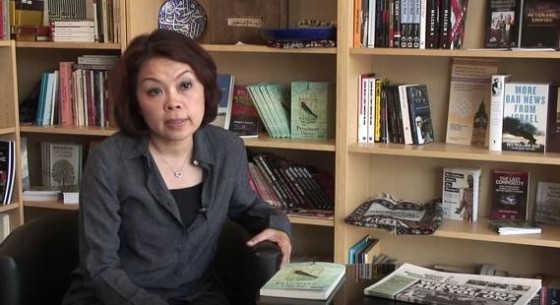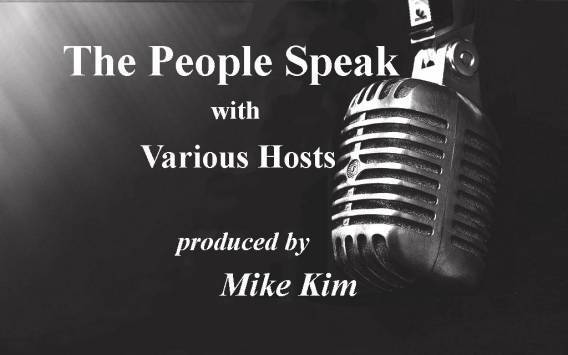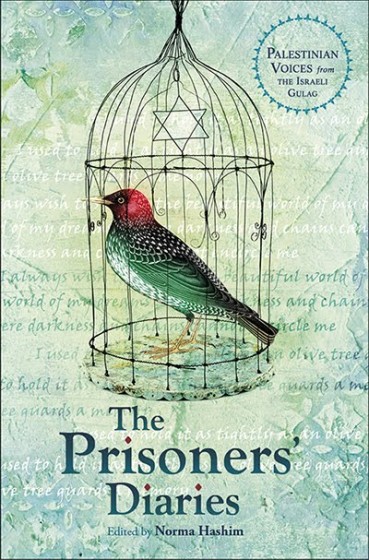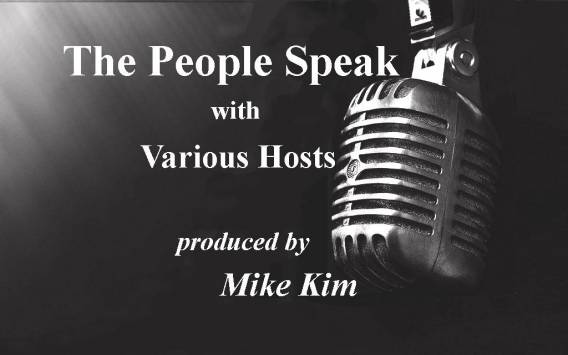The People Speak, November 8, 2016
The People Speak with Steve Johnson and guest Norma Hashim
Guest, Norma Hashim

The Prisoners’ Diaries provides a series of first-person commentaries on what Palestinian prisoners have been enduring for decades in the dark recesses of Israel’s unlawful and inhumane network of prisons. This book combines the witnessing by prisoners with just enough information about the magnitude of the Israeli prison system to give readers a true understanding of this most agonizing dimension of the Palestinian ordeal.
" This book is so valuable as it combines the witnessing by prisoners with just enough information about the magnitude of the Israeli prison system to give readers a true understanding of this most agonizing dimension of the Palestinian ordeal.”
− Richard Falk, Albert G. Milbank Professor of International Law Emeritus, Princeton University and UN Special Rapporteur for occupied Palestinian Territories
“ I defy you to read these stories and not weep for Jews and Palestinians. Now dry your eyes and work for justice, peace and reconciliation.”
− Stephen Robert Sizer, Anglican vicar of Christ Church, Virginia Water, Surrey, England, writer, peace activist and freelance photographer
“ A humane, beautiful, valuable yet painful book. I ask all people of conscience to read it to learn more about the suffering of the Palestinian detainees in Israeli Occupation prisons.”
− Hana Shalabi, former hunger striker, Hasharon prison, Tel Aviv
Dreaming of Freedom Edited by Norma Hashim
- Paperback: 184 pages
- Publisher: Saba Islamic Media; 1st edition (2016)
- ISBN-13: 978-9675068966
Foreword (Dreaming of Freedom: Palestinian Child Prisoners Speak)
What strikes me most directly after reading these moving statements by Palestinian child prisoners is the aura of state terror that pervades the lives of all Palestinians living under occupation. Horrifying as is the experience of these children, mainly mid-teenagers, the deeper horror is the degree to which the entire community of Palestinians is scarred for life by Israeli brutality. Of course, it is the stone throwing children that bear the brunt of the violence that is reported by the vivid statements compiled here, but their younger siblings and older parents and relatives that are also being scarred for life by the arrest and interrogation process developed by Israel that seems calculated to be as intimidating as possible.
Reading through such pages of torment, a pattern of abuse clearly emerges that exhibits Israel’s total disregard for international human rights and international humanitarian law as it applies to these young Palestinians, who are totally vulnerable to such oppressive tactics. Although international humanitarian law fails to focus with sufficient specificity on the vulnerability of children, there are some general measures of protection given in Articles 71-74 of the Fourth Geneva Convention, which ensures that any civilian subject to occupation who is charged with criminal activity shall be informed in writing in a language that he or she understands, is assured the right to the assistance of a lawyer, and must be given the opportunity to present evidence in defense. It is no surprise, based on our knowledge of Israel’s apartheid administration of Palestinians living under occupation that none of these rights are recognized and respected. Indeed, the daily reality of life for Palestinians of all ages is one of rightlessness and unconditional vulnerability.
Despite the generality of abuse to which Palestinians of all ages are subjected to throughout their entire life, it is important to take account of the particular forms of experience that are the tragic destiny of Palestinian children, realities that begin from the earliest stages of childhood. What these reports convey as a result of their overlapping accounts narrated with a concreteness that makes the reader confident about the credibility of the stories being told. This credibility is further reinforced by the consistent reports of respected Palestinian and Israeli NGOs concerned with the protection of human rights of those being subjected to the rigors of Israeli criminal law enforcement. In other words, from everything we know, there is every reason to place trust in the accuracy of these first-person accounts, and given the careful method by which this material was assembled it is possible to construct an accurate portrayal of this pattern of lawless law.
Among the features of this pattern that particularly stand out, I would mention the practice of apprehending Palestinian youth accused of resistance activity in the middle of the night in the presence of the entire family including very young siblings. The accused youth is literally seized from his home and family without being informed of what he is alleged to have done, with parents being given no idea where he is being taken and for how long. Invariably, as well, the child being taken captive is painfully tied and blindfolded often in the presence of his family, thrown onto the floor of a military car, and generally badly beaten while being taken to an interrogation center or some preliminary holding area. The interrogation process is itself completely alienating and calculated to overcome even the most stubborn refusal of a teenage boy to cooperate with his jailors by acknowledging guilt.
It seems clear that the ‘crime’ that almost all of these Palestinian children are accused is throwing stones at vehicles that belong to Israeli security forces or settlers. There is no claim by the Israeli authorities that these stones caused any injury or even damage, but the allegations are treated as if involving the most serious imaginable crimes. As has been observed by progressive Israeli journalists and others, the throwing of stones should be principally understood as forms of symbolic violence expressive of the inherent right to resist unlawful and abusive occupation. What is more, such stone throwing is consistently met with excessive force by Israel that constitutes violence of a much more punitive and consequential nature, and seems inflicted with an intent to intimidate not only the immediate victim but Palestinian youth in general.
In the end, the tactics used by Israel are mostly successful in extracting confessions from the Palestinian children, seemingly regardless of whether the allegations are accurate or mistaken. What we take away from the ‘confessions’ reported in these statements is an utter inability to determine whether it is accurate or fake. As the prisoners are being threatened with continuous beatings, contrived reports that others have independently confirmed the accusations, prison ‘plants’ or ‘snitches’ who mislead the accused on behalf of the captors, and a variety of abusive practices, it is hardly surprising that the will of these children is eventually broken in almost all cases. In a manner that I encountered in apartheid South Africa maintaining innocence is usually punished worse than confessions, whether true of false, and thus there is no incentive whatsoever to hold out. What is even more dehumanizing, is the demand of Israeli officials that these Palestinian teenagers implicate their friends and neighbors. It is evident that several of narrations compiled here report great courage in holding out by refusing to confess, although in such a confined setting where the difference between guilt and innocence is obliterated the significance of such a sacrificial resolve of steadfastness is rarely appreciated or even known in the outside world.
Another striking feature of this arrest and interrogation experience is the punitive reliance by Israel on post-release punishment in the form of house arrest. Several of these young Palestinians declare that would prefer confinement in an Israel prison than enduring house arrest. At first, this preference is difficult to comprehend. On reflection, it becomes more understandable given the nature of life under occupation that allows so few opportunities for satisfaction, and house arrest is a tantalizing deprivation of the comraderie of friendship and neighborhood life.
These Palestinian children express a shared feeling of humiliation that seems to be even more painful for them than the beatings received. The word (izlaal in Arabic) recurs repeatedly in these narratives, and I think testifies to the dehumanizing effects caused by feelings of helplessness and futility, which Israel seeks to induce so as to give rise to an atmosphere among Palestinians of resignation, if not spiritual surrender. A similar approach is evident in relation to house demolitions that are justified in the name of security, but are carried out for the sake of collective punishment and intimidation. Jeff Halper, a respected Israeli critic of the practice estimates that less than 1% of all house demolitions have a genuine security justification.
There are several conclusions that emerge from this deeply moving collection of separate but interconnected witnessing by these Palestinian children. First of all, the urgent need for a distinct international treaty devoted to the situation of children living under conditions of prolonged occupation. Realizing that Israeli occupation has lasted almost half a century with no end in sight, it is intolerable from the perspective of human dignity and human rights, to fail to offer much more concrete protection, including procedures for redress of grievances. Secondly, we need studies of the longer term effects in terms of trauma of such arrest and interrogation experiences, as well as on the impact on families and communities not only of the dynamics of victimization, but also of the shared sense of hopelessness that is the inevitable byproduct of witnessing a brother or son dragged away by abusive soldiers in the middle of the night. And thirdly, we need widespread dissemination of these Israeli policies and practices, especially as carried out with the evident intent of immobilizing resistance to an unlawful occupation that has gone on far too long.
In this spirit, I commend a close reading of Dreaming of Freedom: Palestinian Child Prisoners Speak. With such knowledge solidarity with the Palestinian struggle for freedom and dignity becomes almost a psychological inevitability and an even more urgent moral imperative of our world than we previously realized.
Richard Falk
The People Speak

The People Speak has evolved over the years with many great guests who have been interviewed by some very fine hosts.
We are a 55 minute show airing every other Sunday between 5-6pm Pacific/8-9pm Eastern. The show features a guest interview from any number of realms of interest (entertainment, science, philosophy, healing, spirituality, activism, politics, literature, etc.).
The guests share their stories, lives, strategies, books, philosophy, films, music, or whatever it is they use as a vehicle for making a difference for the better.
The radio show name, The People Speak, is based on the idea of allowing our audience - the People - a chance to interact with the guests during the hour, and we take phone or text questions from them during the interview.
Past guests include such notables as Nobel Peace Laureate Archbishop Desmond Tutu, the late Howard Zinn, Nobel Laureates Mairead Maguire, Shirin Ebadi, Kathryn Najimy, Oliver Stone, Jesse Ventura, Richard Belzer, Cynthia McKinney, Cindy Sheehan, Scott Horton, Joan Jett, Willie Nelson, George Galloway, Roseanne Barr, Ed Asner, Chevy Chase, as well as various reps from Amnesty International, UN World Food Programme, and many others.










